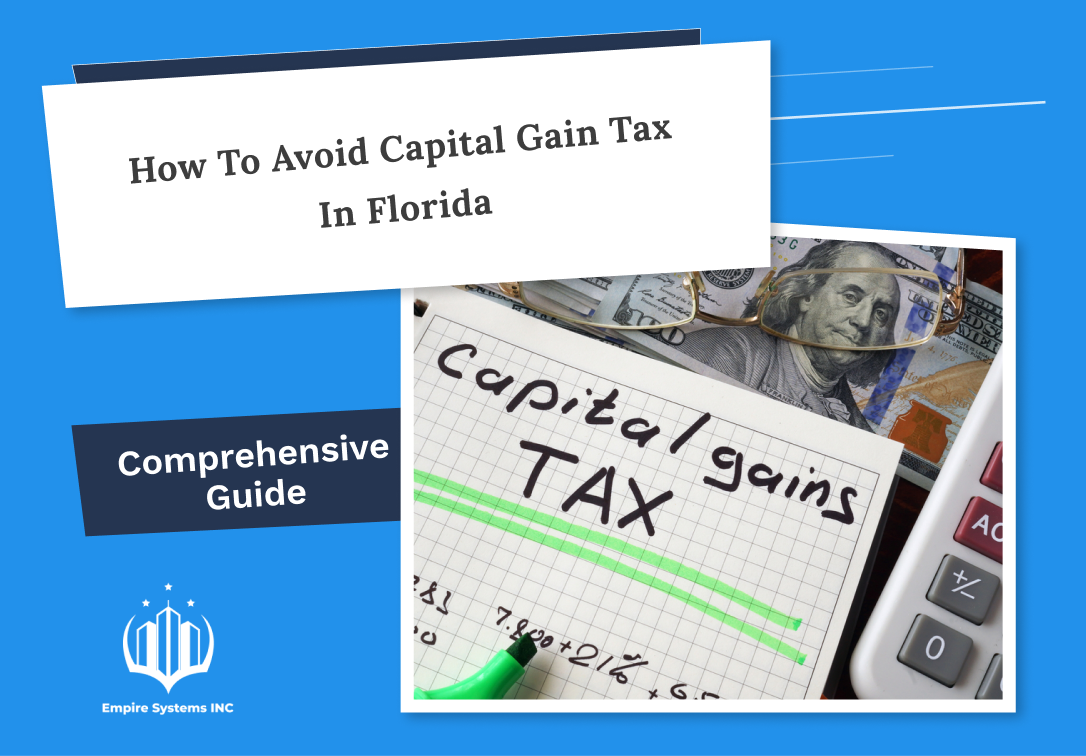
How to Avoid Capital Gain Tax in Florida
Have you ever heard about capital gains tax in Florida and wondered what it is all about? Well, you’re not alone. Many people in Florida buy and sell houses but are surprised by this tax when they sell their property for more than they bought. It’s like a hidden cost that can take much of your profit. But here’s some good news – there are ways to reduce or even avoid this tax!
In Florida, famous for its beautiful beaches and sunny weather, understanding capital gains tax can save you a lot of money, especially if you’re considering selling your house in Florida. In this article, we’ll explore Florida’s capital gains tax and how it works in Florida and share some smart tips on how to avoid paying too much. Whether you’re selling your first home or are a seasoned property investor, these tips can help you keep more money in your pocket.
What is Capital Gain Tax?
Capital gains tax is a financial levy imposed on the profit earned from selling an asset, such as real estate. When you sell a property for more than its purchase price, you may owe taxes on the profit. It’s a tax on your financial gains and applies to various assets, including capital gains tax on real estate in Florida.
Capital Gains Tax in Florida
Florida, known for its favorable tax climate, has its own rules regarding capital gains tax. In the Sunshine State, capital gains tax is typically aligned with federal capital gains tax in Florida. However, Florida’s lack of state income tax can offer some advantages regarding real estate transactions.
Ways You Can Avoid Capital Gains Tax in Florida
Now, let’s explore effective strategies to minimize or bypass capital gains tax in Florida.
Utilize the Primary Residence Exclusion
One of the most well-known ways to reduce capital gains tax is by utilizing the Primary Residence Exclusion. If you’ve lived in your home for at least two of the past five years, you can exclude up to $250,000 (or $500,000 for married couples) of capital gains from your taxable income. This exclusion particularly benefits homeowners looking to sell their primary residence while enjoying substantial tax savings.
Invest in Opportunity Zones
Florida boasts designated Opportunity Zones that offer tax incentives for real estate investments. By putting your money into these zones, you can defer or reduce capital gains tax while revitalizing economically distressed areas. Investing in Opportunity Zones not only benefits your financial portfolio but also contributes to the growth and development of underserved communities in Florida.
Take Advantage of Tax-Deferred Exchanges
Section 1031 exchanges allow you to defer capital gains tax by reinvesting the proceeds from selling one property into another like-kind property. This strategy is beneficial for real estate investors looking to upgrade or diversify their property portfolio. While preserving their gains and deferring tax payments later.
Offset Gains with Capital Losses
Capital losses can be used to offset capital gains, reducing your overall tax liability. Planning and portfolio management can help you balance your gains and losses effectively. By strategically timing your transactions and offsetting gains with losses, you can optimize your tax position in Florida’s real estate market.
Consider Long-Term Investments
In Florida, the capital gains tax is typically divided into two categories: short-term and long-term capital gains tax in Florida. Long-term capital gains refer to the profits from the sale of assets held for over one year. Holding onto your investments for the long term can result in lower capital gains tax rates. Making long-term investment strategies attractive for those seeking to minimize their Florida tax liability.
Explore Retirement Accounts
Certain retirement accounts, such as a Self-Directed IRA, can be used for real estate investments without immediate capital gains tax consequences. By leveraging retirement accounts for real estate investments, you can enjoy tax-deferred growth and potentially defer capital gains tax until retirement.
Gift Assets Strategically
Strategic gifting of assets to family members or heirs can be a tax-efficient way to transfer property and potentially avoid capital gains tax. Properly structured gifts can provide for your loved ones and allow you to pass on assets without incurring significant tax burdens in Florida.
Charitable Contributions
Donating appreciated real estate to a qualified charity can benefit a charitable cause and allow you to avoid capital gains tax on the property’s appreciated value. This philanthropic approach not only supports worthy causes but also provides a tax-efficient strategy for disposing of real estate assets in Florida.
Transform Your Real Estate Dreams into Reality with Cash 4 Homes
Ready to put these strategies into action? Explore how Cash 4 Homes can guide you through the intricacies of Florida’s real estate market and tax landscape. They specialize in making your real estate dreams a reality while optimizing your financial outcomes. Their experienced team is here to assist you every step of the way, from finding the perfect property to navigating tax-efficient transactions. Don’t let capital gains tax dim your real estate aspirations. Visit Cash 4 Homes today and embark on a journey towards a brighter financial future.
Conclusion
In conclusion, capital gains tax in Florida need not be a hurdle in your real estate journey. You can confidently navigate this tax landscape with knowledge and the right strategies. Remember, professional guidance can be invaluable in ensuring you make the most tax-efficient decisions in the dynamic Florida real estate market. Whether you’re a homeowner, investor, or someone with real estate aspirations. These strategies can help you keep more of your hard-earned money while enjoying the sunny opportunities that Florida’s real estate market offers. Stay informed, stay savvy, and let your real estate dreams shine!







